Faculty and Consultants: Master of Science, Architecture, Health and Design (M.S.AHD)
Core Faculty
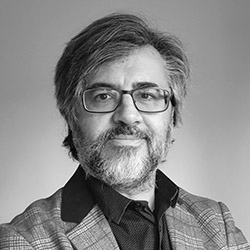
Alessandro Melis, Ph.D., RIBA ARB AOU, is the inaugural IDC Foundation Endowed Chair and a professor in the School of Architecture and Design at the New York Institute of Technology.
In 2019, Melis was appointed by the Italian Minister of Culture as the curator of the Italian Pavilion at the 17th International La Biennale of Architecture Venice 2021, and, in 2020, Ambassador of Italian Design (ADI).
Read More
Previously, he was full professor of architecture innovation at the University of Portsmouth and the Director of the Cluster for Sustainable Cities in the UK. At the University of Auckland, he was the head of the technology area and director of postgraduate engagement at the School of Architecture and Planning.
Between 2010–2013, Melis was the Director of Brain City Lab at the University of Applied Arts Vienna, a visiting professor at the Foster Foundation and at the Anhalt University Dessau, as well as an honorary fellow at the University of Edinburgh.
In 1996, he founded Heliopolis 21, a multi-awarded architecture practice based in Italy, Germany, and the UK.
Melis is author of more than 200 scholar and popular publications.
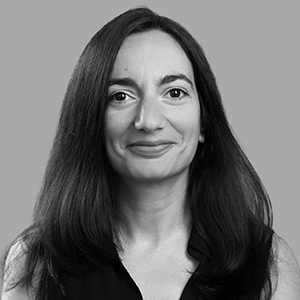
Athina Papadopoulou, Ph.D., is assistant professor in the Architecture, Health and Design, M.S. program at New York Institute of Technology. Athina's recent research focuses on programmable material environments that enhance health and well-being through sensory interaction. In her work, she utilizes various aspects of computing—digital, physical, material, and affective—to create augmented perceptual and human-material interaction systems. Athina received her Master of Science and Doctor of Philosophy in Design Computation with a minor in Human-Computer Interaction from Massachusetts Institute of Technology, where she was a Presidential, a Vergottis, and a Leon Hyzen Fellow, in addition to being a member of the Computational Making Group, which focused on embodied processes of design and making, and the Self-Assembly Lab, which focused on programmable material and fabrication processes.
Read More
As part of her Ph.D. dissertation "Affective Matter: A Haptic Material Modality for Emotion Regulation and Communication," Athina focused her research on therapeutic material systems that interact with the body by responding to physiology signals, such as one's breathing rate, and skin conductance. Building on the research and technology she developed in her dissertation, she founded Affective Matter Inc. to explore wearable applications that aid in the therapy of mental health disorders. She has also worked closely with non-profit organizations to develop courses on inclusive design for individuals with sensory or mental disabilities. Prior to joining New York Tech, she taught design computation and inclusive design studios at MIT, Wentworth Institute of Technology, and Boston Architectural College.
Before receiving her Ph.D. and M.S. from MIT, Athina received a Diploma in Architecture Engineering and a Postgraduate Master's in Design Culture from the National Technical University of Athens, Greece. She is a registered architect in Greece, where she had her own practice and worked at other firms before focusing her career on design and technology research. Athina's research has been published in science and design journals including Nature, Cognitive Science, and Architectural Design, as well as for computation and human-computer interaction conferences.
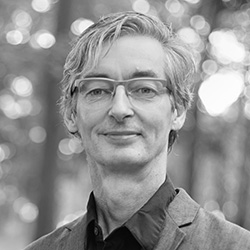
Christian Pongratz, M.Arch, is the director of the M.S. AHD program and a professor of architecture at NYIT School of Architecture and Design (SoAD). He also served in the role of senior advisor to the provost, as well as interim dean of the School of Interdisciplinary Studies and Education at New York Institute of Technology. At SoAD, his research investigates systems of urban resilience, such as a new Design + Health platform engaging communities with NYIT College of Osteopathic Medicine and NYIT School of Management, as well as integrating emerging industries from VR to Robotic Automation.
Read More
Pongratz was previously founding director of the M.S. specialization, Digital Design and Fabrication program and a professor of Architecture at Texas Tech University. He has also taught at AA, UT Austin, and Yeungjin Jr. College, Korea. In New York, he worked for Peter Eisenman and John Reimnitz before co-founding Pongratz Perbellini Architects, which has published widely and received the Segnalazione Compasso d'oro XXI for Hyperwave stone cladding among many international awards. He studied Architecture at TUM and Sci-Arc, and is a licensed architect in Berlin, Germany.
He co-authored (with Perbellini M.) and designed the monograph Peter Eisenman, Heliopolis21, Natural born CaaDesigners, Cyberstone, Digital Media for Design, Digital Design and Fabrication, and Urban Stage (with White D.).
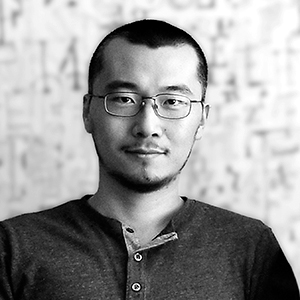
Mengni Zhang, Ph.D. and Registered Architect, is an interdisciplinary design researcher whose main goal in research, teaching, and practice is to improve people's quality of life by designing healthy places and exploring the field of human-built environment interaction. Academically, Zhang has focused on creating adaptive environments through embedded interactions and assistive robotics, and conducting user studies and statistical analyses to evaluate design efficacy and user needs. His Ph.D. dissertation centered on the design, fabrication, and testing of a system of wall-climbing robotic organizers to support domestic routines for independent living. His other research interests range from ergonomics and anthropometric modeling to tsunami evacuation assessment and shelter designs.
Read More
Previously, he completed a master's degree in design studies from Harvard's Graduate School of Design and a bachelor's degree in architecture from Cornell's College of Architecture, Art, and Planning. Professionally, Zhang is a licensed architect, registered in New York State. He has been designing and planning hospitals for five years with projects from the Midwest to the West Coast of the United States that focus on new construction and renovation, as well as international ones that focus on large-scale medical campus competitions.
Zhang has presented or published works at Institute of Electrical and Electronics Engineers conferences (the International Symposium on Robot and Human Interactive Communication, the International Conference on Robotics and Automation), at the Association for Computer Aided Design in Architecture, and by Springer in book chapters on adaptive environments. He has also exhibited: a tactile language encoder for nonverbal communications at Cornell Council for the Arts' Biennial, and an interactive installation aimed at understanding community-engaged, spontaneous group collaboration at Hong Kong/Shenzhen's Bi-City Biennale of Urbanism/Architecture.
Program Experts and Consultants
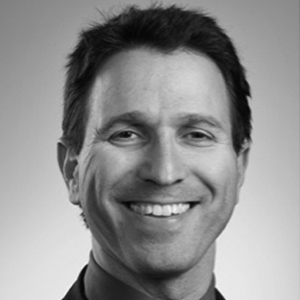
Paul Barach, M.D., M.P.H., Maj(ret.), is an anesthesiologist and critical care physician, former hospital executive, and a leading health systems consultant at J Bara Innovation, as well as a researcher well known for bringing human factors, implementation science, and leadership concepts and evidence into improving healthcare safety and reliability. Barach is a clinical professor at Wayne State University School of Medicine, and is lecturer and senior advisor to the dean at Jefferson College of Population Health. He holds visiting professorial appointments at the Sigmund Freud University, Austria; Milan Polytechnic, Italy; University of Queensland, Australia, and National Cancer Center, Korea. He is an elected member of the lead honorary society, the Association of University Anesthesiologists. He is a former chief quality and safety officer, associate dean for patient safety, associate CMO, founder and director of the Miami Simulation and Skills Center.
Read More
Barach trained at Massachusetts General Hospital and Harvard Medical School and has more than 25 years of experience as a physician executive in the military, and in academic medical centers and integrated delivery systems. He is a trained health services and human factors researcher, with advanced post graduate training in medical education and assessment methods from the Harvard Medical School Josiah Macy Program medical education, lean six sigma, quality improvement and lean techniques at Intermountain Healthcare. He has had additional training in epidemiology and statistics. Barach has been integrally involved in evaluating and promoting human factors, population health, and quality management efforts for the past two decades in several lead healthcare systems and countries, and has advised the WHO on consumer and patient engagement in co-producing better outcomes. He has been invited to contribute to U.S. National Academy of Science working reports and has advised the European Expert Panel on "Investing in Health" (EXPH). He serves on numerous advisory panels on research programs, projects, and training institutes in the US and internationally. He has an extensive track record of improving interprofessional training, health services, and medical education delivery in U.S., Australia, GCC, and Europe. He has led many grant projects and has received career research funding of over $15,000,000 in federal competitive grant funding.
The theories and ideas he has helped shape and research are now in common use including: TeamSTEPPS and team training; human factors common cause adverse event analysis tools; adverse event disclosure and apology; and multi-method, triangulated approaches to research, governance of health systems, and interprofessional learning and culture change to achieve safe and reliable outcomes. He was editor of the British Medical Journal of Quality and Safety, has published more than 300 scientific papers and five books, and his work cited 1more than 1,500 times. He has presented at or chaired international and national conferences, workshops, symposia, and meetings on more than 500 occasions, including delivering over 90 keynote addresses.
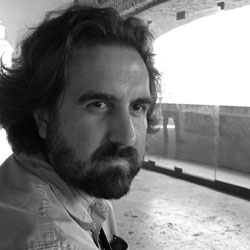
Robert Cody is a registered architect in New York and New Jersey, LEED accredited and a member of the AIA and NCARB. For over 25 years, he has been involved in numerous projects varying from wood-frame houses to precast concrete office buildings, interior renovations to free standing towers, design competitions to physical construction and solar detoxification facilities, to The Museum of Modern Art.
Read More
Cody has taught design studio at all levels, building construction, architectural theory, and summer study abroad in Italy, and has been the chair of architecture in Long Island since 2011. He has also been the New York Tech NCARB IDP coordinator and AIAS faculty advisor since 2012. Cody has coordinated the summer studio, first-, second-, and fourth-year design studios and was co-director of the Italy program since 2013.
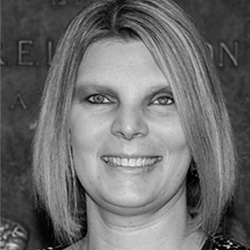
Jennifer Conner, DrPH, M.P.H., MAP, is an assistant professor of clinical medicine at NYIT College of Osteopathic Medicine, Jonesboro. She has extensive experience in behavioral research, clinical health services research, grant administration, community-based public health programming, and policy evaluation. She has brought together academic institutions, hospitals, schools, faith-based organizations, community-based organizations, municipalities, and non-profits to investigate and evaluate a broad range of health topics, including childhood obesity, respiratory illness, traumatic brain injury, cancer, and birth defects. She has also examined healthcare system topics such as access to quality care, safety net benefits, and incentive-based insurance premium programming.
Read More
Conner served as an Assistant Professor at the University of Texas School of Public Health supporting community-based projects in San Antonio and its four contiguous counties. In 2011, she was appointed as Policy Subcommittee Chair for the San Antonio Mayor's Fitness Council. She launched several faith-based obesity prevention programs and developed several community gardens in the area. More recently, Conner worked with the Arkansas Foundation for Medical Care to investigate health disparities and evaluate disease prevention and health promotion strategies across the state. She continued those efforts with the University of Arkansas Cooperative Extension Service as part of the Centers for Disease Control and Prevention High Obesity Program.
Conner has served on the Lake Village Economic Development Commission and was instrumental in launching the Mayors Mentoring Mayors program to advance comprehensive community health and wellness. She has been appointed by the Arkansas Governor to serve as a Priority Lead for Healthy Active Arkansas and serves on the Governor's Advisory Board for Cycling. Conner recently graduated from the Delta Regional Authority Leadership Executive Academy and the Community Development Institute-Central. In 2019, she was named a Robert Wood Johnson Culture of Health Leader program finalist and was instrumental in leading the city of Lake Village, Arkansas, in being named a Robert Wood Johnson Culture of Health Community award finalist.
Conner obtained her Master of Applied Psychology from the University of Arkansas at Little Rock with an emphasis in experimental methodology and design and completed her Master of Public Health in Biostatistics at the University of Arkansas for Medical Sciences (UAMS) College of Public Health (COPH). She received her Doctorate of Public Health in Leadership and Policy from the UAMS COPH.
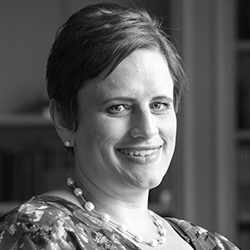
Christine Galante, DNP, ANP-BC, RN, AE-C, is a board-certified adult nurse practitioner, asthma educator, and assistant professor in the Department of Nursing at New York Tech's School of Health Professions. Galante has practiced in acute care, primary care, and long-term care. In March 2021 she completed a post certificate program for end-of-life/palliative care for advanced practice nurses. Galante earned her Doctorate in Nursing Practice Educational Leadership at American Sentinel University in Aurora, Colo., in 2018. She holds a Master of Science in Adult Health, a Bachelor of Science in Nursing from SUNY Stony Brook University, and an Associate degree from Farmingdale State University.
Read More
Galante is active with the Asthma Association of Long Island and a member of the professional school of nursing committee. She is also a member and peer reviewer for American Association of Nurse Practitioners, National Organization of Nurse Practitioner Faculty, Eastern Nursing Research Society, and Sigma Theta Tau International Honor Society of Nursing.
Galante seeks to empower New York Tech's nursing students to become the next generation of critical thinkers, citizens, and professionals. More importantly, she would like to see them envision themselves as future nursing leaders and scholars. By preparing online/on-site activities to deliver content that is both significant and challenging, Galante enables students to think beyond their comfort zone and feel involved in their own learning process.

Farzana Gandhi, is a registered architect in New York and a LEED accredited professional. Her architecture practice, Farzana Gandhi Design Studio, focuses on sustainable and socially conscious solutions, both locally and abroad. At New York Tech, she has been teaching introductory, advanced, and thesis-level architecture design studios, research-driven design-build elective courses, and visualization seminars. Gandhi is most interested in how widespread social impact can be achieved by rethinking the relationship between architecture and its environmental, cultural, and socioeconomic framework.
Read More
By acting at the intersection of multiple disciplines, a single intervention has potential to act as a catalyst for systemic change. Her community outreach work in places like Dakar, Senegal, and Puerto Rico is driven by inquiry, investigation, and integration. She continues to bring this unique approach to design to the classroom, where her students are invited to tackle multi-layered, real-world problems and collaborate to test new dimensions of practice.
Gandhi and her colleagues were recently featured in an episode of Horizons, a BBC worldwide television show, for their patented, climate-appropriate, disaster-relief roof system. Her work in teaching, research, and practice has been recognized with several awards and has been widely exhibited and published.
Gandhi earned a master's degree in architecture with distinction from the Harvard Graduate School of Design. At the University of Pennsylvania, she graduated Phi Beta Kappa with a bachelor of arts in architecture, as well as a bachelor of arts in Spanish with distinction.

Currently Chief Labor Economist and Senior Managing Director in the Savills' Dallas, Texas office, Wayne Gearey, Ph.D., looks forward to bringing his education—a diploma in spatial analytics from Simon Fraser University, postgraduate work in social epidemiology at Johns Hopkins, a Master of Science in Decision Science from the University of Salford—and 25 years worth of work in analytics, including changing how organizations use, share, and visualize data for improved decision-making, to this consultant role. Like NYIT Architecture faculty, Gearey has an interest in sustainability.
Read More
In 2020, he was a delegate to the working group on sustainable development goals for international meetings such as the World Bank as well as Davos, the latter of which brings together members from the private sector, member states, United Nations agencies, and international organizations with the aim of meeting the U.N. Sustainable Development Goals. Gearey also serves as an advisory board member for the faculty of the School of Economic, Political and Policy Sciences at the University of Texas at Dallas, and as an expert with the International Federation of Sport Climbing.
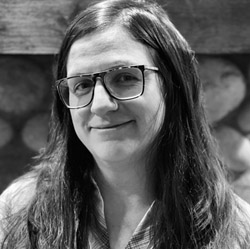
Melissa Huey, is an assistant professor of psychology in the Department of Psychology and Counseling. She received her M.A. from City College of New York and her Ph.D. from Florida Atlantic University.
Huey's research interests are twofold. The first area focuses on parenting and the impact that it has on children's mental health. Her second area focuses on the psychological impact that technology and the smartphone have on young adults.
Read More
Both in and out of the classroom, Huey has leveraged current events, such as the January 2021 U.S. Capitol insurrection, as teachable moments on the importance of critical thinking. Following the events at the Capitol, she joined a multidisciplinary panel of New York Tech faculty and staff to discuss causes for the nation's polarization, the role of social media in spreading misinformation, and conflict resolution skills needed to bridge the ideological divide.
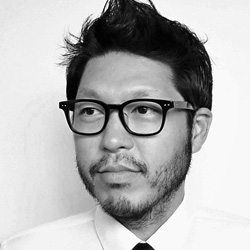
Dong-Sei Kim, is an architect, urbanist, and educator. His current research, focusing on architecture and urbanism's relationship to nation-state borders across multiple scales, examines the notions of "inclusion" and "exclusion" and how "us" and "them" are defined through various spatial practices. His research on the Korean Demilitarized Zone (DMZ) has been internationally recognized through multiple exhibitions and publications.
Read More
Dongsei's research on the DMZ border contributed to the Golden Lion award-winning "Crow's Eye View: The Korean Peninsula" exhibition curated by Minsuk Cho, Hyungmin Pai and Changmo Ahn at the 14th International Architecture Exhibition directed by Rem Koolhaas (Venice, 2014). Recently, his work has been invited to exhibitions such as the "Active Archive" at the Seoul Biennale of Architecture and Urbanism (Seoul, 2017); "(im)positions" at Melbourne School of Design (Melbourne, 2017); "Over the Boundary" at the State Library of Queensland (Brisbane, 2016); "REAL DMZ PROJECT" at Art Sonje Center (Seoul, 2015); "Making Border" at DNA Gallery (Berlin, 2015); and "Cold War, Hot Peace" at Slought (Philadelphia, 2015).
He served as an assistant professor at Korea University and an adjunct assistant professor at Columbia University, GSAPP before joining New York Tech. Additionally, he has taught architecture, landscape architecture, and urban design studios and seminars at Carleton University (Canada); Kyung Hee University (Korea); Monash University (Australia); RMIT University (Australia); and Victoria University of Wellington (New Zealand).
Dongsei practiced architecture in Wellington, Seoul, and New York, and gained his registration as an architect with the New Zealand Registered Architects Board (NZRAB) in 2007. He is an architect member of the New Zealand Institute of Architects (NZIA) and served as a Research Advisory Committee member at the Institute of Trans-Division and Border Studies (ITBS) in Seoul, Korea (2015–2018).
Dongsei holds a Master in Design Studies with Distinction from Harvard Graduate School of Design. He also earned his M.S. in Architecture and Urban Design from Columbia University, GSAPP and a professional Bachelor of Architecture with honors from Victoria University of Wellington.
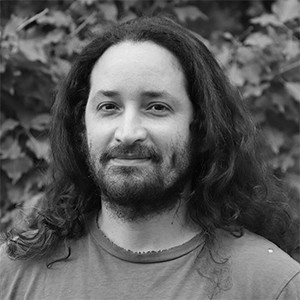
Nelson Montas Laracuente, Ph.D., is an architect, researcher and software developer. He holds a degree in Architecture from the Pedro Henríquez Ureña National University (2006) in Santo Domingo, Dominican Republic, a Master of Science in Biodigital Architecture (2009) and a Ph.D. in Genetic Architecture (2016) specializing in simulation, biomimicry and programmable matter, both from the International University of Catalonia, and lastly, he holds an A.S. degree in Web and Software Development from the Université de Versailles Saint-Quentin-en-Yvelines, in France (2022).
Read More
He was a visiting researcher at the MAP-MAACC, CNRS-MCC UMR laboratory at the École Nationale Supérieure d'Architecture (ENSA) Paris-La-Villette (2015). Moveover, he has been a designer and consultant for e-architects (2017–2018, NY, USA), INSITU Architecture (2019–2020, Paris, France) and Eca2 (2019, Paris-Hong Kong). Furthermore, he was a professor of Project Presentation, Linear Perspective and Technical Drawing at the Pontificia Universidad Católica Madre y Maestra (2012–2014; 2018) where he also held an associate researcher position in the state-funded project titled "Environmental analysis, simulation and digital fabrication of finishing products and construction systems in non-structural façades" (2018–2019).
Currently, has been appointed to a position as a Deep Learning Researcher, within the ArcGAN/ARCHER project, an architectural heritage reconstruction research team at the Universidad Francisco de Vitoria in Madrid, Spain. He has published and taught in a wide array of topics ranging from computational design, biomimicry and materials simulation to machine learning applications in structural design and digital fabrication.

Brookshield Laurent, D.O., is chair and associate professor of the Department of Clinical Medicine at NYIT College of Osteopathic Medicine at Arkansas State University and is the founding executive director of the Delta Population Health Institute. Laurent earned her doctorate in osteopathic medicine in 2009 from Rowan School of Osteopathic Medicine (New Jersey). She then received specialty training in family medicine at Christiana Health Care System in Wilmington, Delaware.
Read More
Since joining NYITCOM in 2012, Laurent has led curricular advancement in the foundational clinical skills course: the Doctor-Patient Relationship. This course helps student physicians learn professionalism, interpersonal communication, cultural competency, clinical decision-making, and physical exam skills. She was then appointed chair of the Department of Clinical Medicine at NYITCOM's site at Arkansas State University. There, she leads faculty of multiple clinical specialties and spurs professional and leadership development.
Laurent is a recipient of the Osteopathic Health Policy Fellowship sponsored by the American Osteopathic Association. This fellowship is a leadership training program on the analysis, formulation, and implementation of health policy on the local, state, and national levels. Its purpose is to increase access to affordable, quality health care.
Laurent is an advocate for health equity and a leader in addressing social determinants of health to transform community health outcomes. She is a driver in enlarging capacities for innovation in medical education, population health, and community development. As the executive director for the Delta Population Health Institute, Laurent leverages resources in education, research, policy, and community engagement to bring about policy, system, and environmental change. The institute aims to create a culture of health in the Delta.
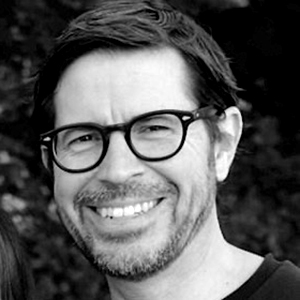
Chris Lawer is the founder of Umio, the creator of the Health Ecosystem Value Design® (HEVD) framework, and the author of Interactional Creation of Health: Experience Ecosystem Ontology, Task and Method.
In addition to leading Umio, Chris is an independent scholar. He has a pre-Ph.D. research degree from Cranfield School of Management and has published a handful of journal papers. His alma mater is the University of Liverpool, where he majored in geography and urban studies.
Read More
Lawer spent two decades as an innovation consultant to companies of all kinds and sizes throughout the EU and US with occasional forays into China and Japan. He has conducted and mentored dozens of innovation projects, gaining extensive experience of multiple industries and markets spanning automotive, chemicals, energy and materials, healthcare, pharma and medtech, financial services, and consumer goods.
Chris is based near Oxford U.K. and works globally.
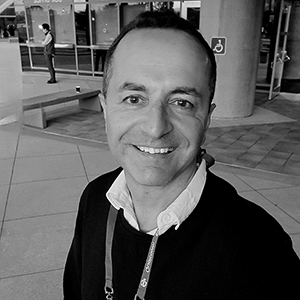
Emoshape Inc. Founder and CEO Patrick Levy-Rosenthal has studied the processes underlying each emotional response, emotion synthesis, and the influence of emotion on decision-making. Having grown up in Paris, Levy-Rosenthal moved to New York City to work and develop his passion and ideas. His 2006 invention, Virtual Lens, is used today by more than 1.3 billion people daily on Snapchat and Instagram.
Read More
He also developed a new generation of microchips called EPU (Emotion Processing Units) for artificial intelligence and robots, and the world's first Al that can feel 64 trillion possible states every tenth of a second. He has presented to the Artificial Intelligence Council of the United Nations, and been written about in Forbes magazine.
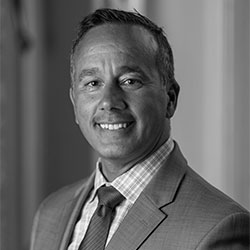
Alexander Lopez received his Bachelor of Science in Occupational Therapy from Kean University in 1997 and a Juris Doctor from New England Law in 2004. As a licensed occupational therapy practitioner and attorney, he has engaged in several community-based initiatives focused on under-served groups. In addition, Lopez has been instrumental in bringing non-traditional services to governmental and private community-based organizations. In 2007, he founded PAR FORE, a golf mentoring program that utilizes the occupational activity of golf as a medium for developing valuable life skills.
Read More
Since its inception, PAR FORE has grown from serving a handful of adolescents in New York to serving children in Utah, New Jersey, and Nevada. In 2013, Lopez founded Inclusive Sports and Fitness Inc., a nonprofit aimed to meet the occupational needs of children with performance skill impairments and help them advance their sensorimotor, social, emotional, and cognitive abilities. In addition, he collaborates with industry leaders in science and technology to explore and introduce innovative and more reliable interventions for children.
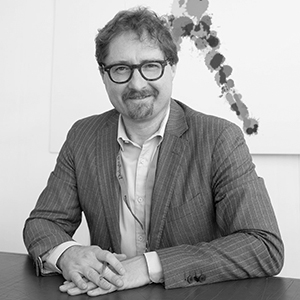
Telmo Pievani is full professor in the department of biology, University of Padua, where he has covered the first Italian chair of Philosophy of Biological Sciences since 2015. After Ph.D. research in the United States, he was Professor of Philosophy of Science at the University of Milan Bicocca (2001–2012).
Past president (2017–2019) of the Italian Society of Evolutionary Biology, he is a fellow of several academic institutions and scientific societies, including the scientific board of science festivals in Italy and the International Scientific Council of MUSE in Trento.
Read More
He is author of 302 publications, included several books: Introduction to Philosophy of Biology (Laterza, 2005); The Theory of Evolution (Il Mulino, 2010); Born to Believe (Codice Edizioni, 2008, with V. Girotto and G. Vallortigara); The Unexpected Life (Cortina Editore, 2011); Homo Sapiens: The Great History of Human Diversity (Codice Edizioni, 2011, with L.L. Cavalli Sforza); Introduction to Darwin (Laterza, 2012); The End of the World (Il Mulino, 2012); Freedom of Migration (Einaudi, 2016, with V. Calzolaio); How We Will Be (Codice Edizioni, 2016, with L. De Biase); Imperfection: A Natural History (Cortina, 2019; MIT Press, 2022); The Earth After Us (Contrasto, 2019, with F. Lanting's photos), Finitude (Cortina, 2020); and Serendipity (Cortina, 2021).
He is also a member of the editorial boards of Evolution: Education and Outreach, Evolutionary Biology, Nature Italy, Istituto Treccani, and the Italian edition of Scientific American, and the director of both Pikaia, the Italian website dedicated to evolution, and the University of Padua web magazine Il Bo LIVE.
With Niles Eldredge, Ian Tattersall, and Luigi Luca Cavalli-Sforza, he has curated international science exhibitions.
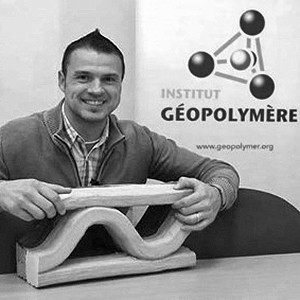
Alex Reggiani is a geologist and consultant with a degree in specialized mineralogical geology (2003) from the University of Modena, Italy. From June 2017 to today, Alex is a partner and product manager for new products based on the geopolymer binder in the company GeoMITS Srl, Sassuolo, Italy. He is also responsible for the research and development laboratory in Castelnuovo Rangone (MO).
Read More
He is also the CTO and product manager of RENCA RUS Ltd (Cheliabynsk, Russia), working on production of geopolymer mortars designed for 3D printing applications; cementifiers, other traditional binders and new geopolymer-based binders. He is responsible for research and development, quality control in Italy for VICAT (France).
He has been a consultant for Heres Srl, Quinto (TV), Italy on new raw materials such as Prompt Natural Cement and different types of pozzolan and additives to improve the properties of their products based on hydrates and hydraulic binders, especially with cocciopesto. As a chemist and production technician for Technokolla Spa, he participated in the design of new products using different types of traditional binders: repair mortars, rapid repair mortars, self-levelling (for interiors and exteriors), self-compacting concrete, injection mortars with or without OPC, waterproofing membrane, multi-consistency tile adhesives, fiber tile adhesive, NHL tile adhesives, NHL plasters, cement plasters, finishing mortars, sealants, mortars epoxies, tile adhesives of the past).
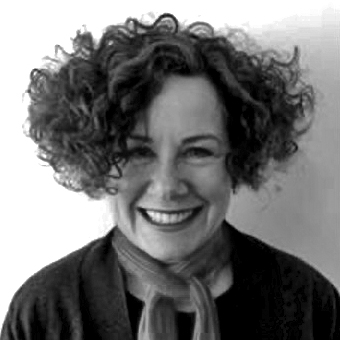
Catsou Roberts is the director of Vital Arts, the charitably funded arts and health organization within Barts Health NHS Trust in London.
She advocates for raising the standard of art and design within healthcare, regularly writing and lecturing on the topic for both cultural and clinical audiences. She serves in various advisory roles including for Maggie's cancer care, Culture Mile/City of London, and previously, Tate Exchange, Venice Architecture Biennale (Italian Pavilion 2020), and the AHRC-funded Dementia Connect.
Read More
Roberts has juried several public realm design competitions, art prizes, and awards—including Building Better Healthcare Awards, which she joined in 2022 as judge for the Patient Experience category, focusing on art, interior design, and landscaping projects. Previously, Roberts was senior curator at Arnolfini, Bristol, where she directed the Exhibition Department and curated group and monographic shows of Janice Kerbel, Joachim Koester, Liam Gillick, Victor Burgin, Michael Snow, and Vito Acconci (his first in the United Kingdom).
From 1992, Roberts curated several freelance exhibitions in the United States, Canada, Germany, Spain, Sweden, Holland, Denmark, and Ireland that included work by Pierre Huyghe, Sarah Morris, Douglas Gordon, Fiona Banner, and Sam Taylor-Wood, among dozens of others. In 2015, she guest-curated a city-wide photography festival in France entitled The Vanishing Point of History that included Larry Achiampong, Bertille Bak, Eric Baudelaire, David Blandy, Matthew Buckingham, Mounir Fatmi, Melik Ohanian, Uriel Orlow, Lina Selander, and many more. Roberts was a Helena Rubinstein Fellow in Museum Studies at the Whitney Independent Study Program in 1989–1990, and later attended the École du Magasin curating program in Grenoble, France.
She earned a degree in art history at Barnard College, Columbia University, before undertaking graduate work in the history and theory of modern and contemporary art at the State University of New York at Stony Brook. In the United Kingdom, she has been a visiting lecturer at Goldsmiths, Queen Mary University of London, Birkbeck, Slade, Westminster, Royal College of Art, Central Saint Martins, Kingston, and, internationally, at the Royal Danish Academy, Konstfack, Stockholm, Art Academy Helsinki, Kunsthøgskolen Bergen, Norwegian University of Science and Technology Trondheim, Iuav University of Venice, and others. Frequently featured in the printed press, radio, and television, she is also a long-standing elected member of the International Association of Art Critics and the International Association of Curators of Contemporary Art. Roberts has lived and worked in the United States, the United Kingdom, France, Germany, and Japan.
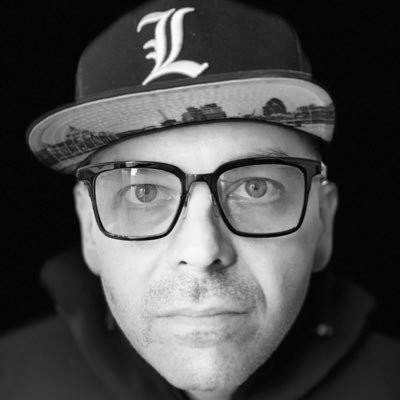
Luke Schantz, is a Technical Community Director and Program Manager at the Linux Foundation, where he works with the OpenJS Foundation and R Consortium. He is an experienced and enthusiastic creative and technical generalist with a broad range of technical knowledge and high emotional intelligence. Prior to his current role, he was an IBM Senior Developer Advocate, Podcast Lead, and Quantum Ambassador, as well as a Startup Advocate and Community Manager at SoftLayer. Luke has also served as the CTO and co-founder of a startup. In addition to his career in technology, Luke has worked in the arts and entertainment industry as the Visual FX lead for the Blue Man Group and has produced marketing activations for leading digital agencies and major brands. In his free time, Luke enjoys making music and graphics in his multi-media studio and is developing a permaculture farm in Connecticut. He is currently working on an MBA degree.
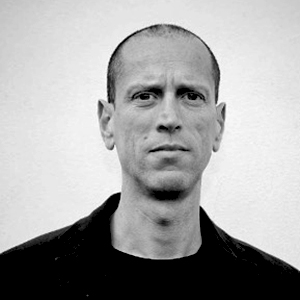
Simone Sfriso is an architect and co-principal of TAMassociati, an architecture firm based in Venice, Italy. Sfriso was born in London, UK in 1966, and was awarded a Master's Degree 110/110 summa cum laude in Architecture at the University of Architecture of Venice IUAV.
TAMassociati comprises a team of architects, engineers, and researchers, whose building solutions worldwide improve lives, strengthen communities, and provide creative responses to climate change: combining high quality with affordability. The firm's design ethos can be summed up as "Innovative design for Impact." Internationally, TAMassociati works on sustainable and socially equitable architecture.
Read More
The office has won widespread recognition and numerous prizes. In 2013, it received the Aga Khan Award for Architecture for its work on the Salam Centre for Cardiac Surgery in Sudan; the international Capocchin-G.Ius Gold Medal for construction of the world's most sustainable pediatric hospital (Port Sudan) and the Curry Stone Design Prize for the overall sustainability (social and environmental) of recent projects built in different parts of the world. In 2014, the practice won the Zumtobel Group Award for innovation and sustainability. TAMassociati was named Italian Architect of the Year for 2014 "for its ability to enhance the ethical dimension of the profession." It was the curatorial team of the Italian Pavilion at the 15th International Architecture Exhibition of La Biennale di Venezia 2016. In 2017, the firm won the LafargeHolcim Awards Acknowledgement prize for their project "Maisha Film Lab," Kampala, Uganda.
Currently TAMassociati is working in Uganda, Cameroon, Kenya, Rwanda, Senegal, Switzerland, Yemen, Lebanon, and Italy.
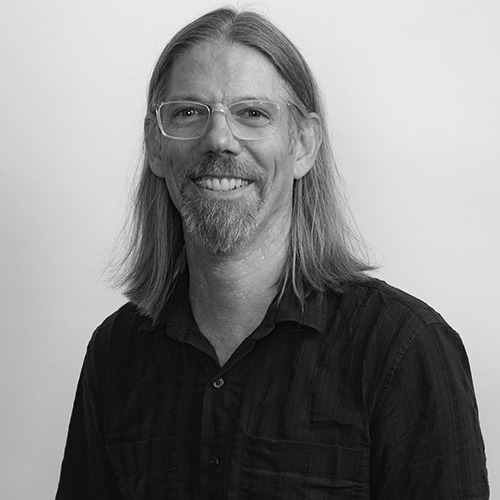
F. Clarke Snell, AIA, is an Associate Professor, Building Technologies, in the School of Architecture and Design at New York Institute of Technology. He is a licensed architect with a background in design-build. His professional and academic focus is to develop and apply sustainable and resilient building systems toward a zero-resource architecture.
Read More
He splits his efforts between (1) applying research into low-tech, high performance materials, assemblies, and systems to the design and construction of small buildings and their microclimates with the goal of repeatable and quantifiable reductions in project carbon footprint; and (2) developing architectural workflows that allow performance modeling and simulation to inform form-making. He has written several books and numerous articles on related topics.
In academia, he has taught a variety of studios and core courses in both architecture and engineering and has conducted research that covers a wide range of topics, from developing and testing low-tech, low-carbon building envelopes, to investigations into high performance, low-carbon material science, to methodologies for teaching sustainable design. His design-build work with students features two Solar Decathlon competitions, including the 2015 winning entry.

Kat Usop, is a digital health innovator and a long-term globetrotter. She specializes in implementing gamification models in disease management, consumer health, and precision medicine. She has diverse experiences in the facets of research, development, and management of medical devices and de novo health technologies. Usop, who earned a Master of Science in Health Informatics and Bioinformatics from the University of Missouri-Columbia, was part of the genesis of gamified virtual workspaces for preoperative surgical training and communication using biomimicry techniques; in 2018, this effort was presented at Harvard Medical School amongst pioneers of VR and AR in health.
Read More
Consequently, she was able to drive her current venture, Gina Health, to become a finalist at the 2020 NC TECH State of Technology Conference for its unique design in gamifying a mental-health platform. She also contributed to the wearable (biomedical) data management and governance at Duke University-Biomedical Engineering. She was also fortunate to be selected as the youngest adjunct professor of risk management of medical devices at the age of 23.
And at the age of 19, she started the IEEE Direct 2 Students initiative (D2S) in the Philippines which focuses on producing innovative yet essential technologies for the aftermath of natural calamities in the Asia-Pacific region. This effort was replicated in India, Bangladesh, and Hong Kong. Devoted to the advancement of innovative healthcare, Usop is an active peer reviewer at key journals (IEEE Journal of Biomedical and Health Informatics, Journal of Medical Internet Research).
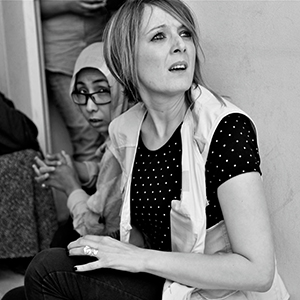
Elisa Visconti, executive director of World Italy, which is part of the international network Médecins du Monde (Doctors of the World), has been a humanitarian worker for more than 18 years across Africa, Asia, the Middle East, and Europe.
Read More
She has mostly designed and managed health-related interventions, directing operations and coordinating advocacy programs at the national and international level. In 2020, Visconti, who holds a master's degree in philosophy and a bachelor's degree in physics, collaborated with the Italian Pavilion of the Venice Biennale.
In Memorium
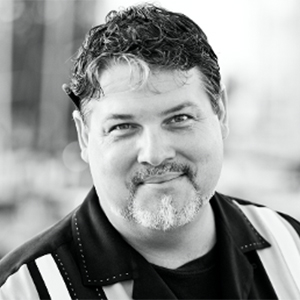
With deep sadness and heavy hearts, the executive team at BlackHägen Design, Inc. (BH) announced the sudden passing of Sean Hägen, founding principal and director of research and synthesis. Instrumental in the early stages of the M.S.AHD program, Sean amassed over 30 years of design research and product development experience in a variety of industries ranging from transportation design (boats, yachts, and executive aircraft), to emergency management center workstations and mission critical ruggedized electronics, to medical devices and graphic user interfaces.
Sean will be greatly missed, but his wisdom and legacy will certainly be carried on by those he inspired, led, and nurtured.